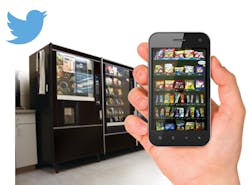Over the last several years, the vending industry has seen more social media oriented vending machines. That’s not surprising, as companies are finding ways in which to interweave social media in everyday things. According to PewResearch Internet Project, 73 percent of adults who use the Internet are on social networking sites, including 71 percent who are on Facebook, 18 percent who use Twitter and 22 percent who use LinkedIn. There are many opportunities to partner social media into vending, however, operators must remember that all good things can backfire. Here are several social media and vending campaigns that worked….and one that didn’t.
- Mondelez International Custom Oreos Based On Tweets: At the South By Southwest (SXSW) earlier this year, Mondelez hosted an Oreo Trending Vending Lounge that delivered hyper-personalized and customized snacks based on real-time data collected from attendee tweets. Powered by Twitter, two custom-made vending machines enabled attendees to create and eat custom Oreo cookies based on trending social conversations. Users had to browse “trending flavors” displayed on a large touchscreen, and then they chose from 12 flavors and colors and could watch as their cookie was being built.
- PepsiCo Gives Free Soda For “Likes”: Last year, Pepsi displayed the “Like” machine, a vending machine that accepts “likes”, not money. Users with a smartphone would “Like” Pepsi’s Facebook page, choose their favorite Pepsi and a free can of soda would then dispense from the machine. The “Like” machine allowed Pepsi to have direct access with their consumers. Trade a free Pepsi for your Facebook information? Most users said “heck yes.”
- BEV Trades Iced Tea For Hashtags: In 2012, BOS Ice Tea launched one of the world’s first Twitter-activated vending machines. Users who tweeted to the machine while standing in front of it would receive a free iced tea. The machine would display the user’s Twitter handle using digital signage.
- International CES conference gives t-shirt out for tweets: The 2014 International CES, a technology conference held in Las Vegas, Nev. Jan. 7 to 10, 2014, featured a social media vending machine that allowed users to receive a t-shirt in exchange for a tweet. Conference goers who tweeted using #CES2014 and Twitter handle @intlCES received a CES t-shirt that they could then wear on the show floor for an opportunity to win more prizes.
- And here is the one that didn’t work: Nottinghack. Located in Nottingham, U.K., Nottinghack describes itself as a group of people who like to build, make and learn. Nottinghack members purchased a vending machine from eBay and placed it in their building. Members engineered the machine’s cashless mechanism to connect to its own server, named Holly. When members swipe their RFID cards at the machine, the cashless reader tells Holly to deduct the item balance from the user’s card. When the item was vended, Holly sends a message out on Twitter, stating the buyer’s name (gathered from the card) and what type of product he or she just purchased. The idea was to view the types of trending products and to see if it would encourage office workers to eat healthier. The project backfired. The group shut down the automatic tweets because users didn’t want other people to know what they were buying.
Social media can work if operators use it correctly. It can create a buzz on products or promotions that might increase sales in both vending and micro markets. Before starting a social media campaign, however, be sure to recognize ways in which it could backfire first.
About the Author

Adrienne Klein
Contributing Editor
Adrienne Zimmer Klein is a freelance writer with a background in the vending, micro market and office coffee service industry. She worked as an associate editor and managing editor at Automatic Merchandiser and VendingMarketWatch.com from 2013 until 2017. She is a regular contributing writer at Automatic Merchandiser.
